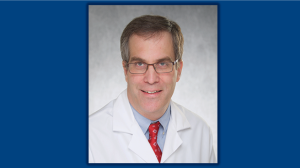Alumni Making a Difference: David Axelrod, MD’96, MBA’96
David Axelrod, MD’96, MBA’96
Professor of Surgery-Transplantation and Hepatobiliary Surgery
University of Iowa
Surgical Director of Kidney/Pancreas and Living Donor Transplant
Department of Surgery
Associate Chief Medical Information Officer
University of Iowa Hospitals and Clinics
Much of your research explores the intersection of economics and medicine. How do economic factors influence transplant care?
I’ve always been interested in understanding the health care marketplace in the context of providing clinical care: How do we improve the clinical enterprise and efficiency so we can provide better care to more people? It’s quite easy to deliver high-quality, cost-efficient care if you’re dealing with a predominantly well-insured, economically advantaged population. But that’s not the population that we care for in this country. How do we maximize efficacy without exacerbating racial, ethnic, economic, and other disparities?
Transplant has some unique characteristics. We don’t have enough organs, so organ allocation, access, and cost are huge issues. We need to ensure that we have a system that ensures maximum use of donated organs without increasing the cost of care so much that hospitals are no longer willing to provide this service.
Transplant requires lifelong care. If I take out someone’s gall bladder, they come back in two weeks and I say, “Your incision looks fine, go live your life.” But in transplant we follow our patients for many, many years. I tell my patients, “You’re trading the disease of end-stage organ failure for the disease of transplant. You’ll need immunosuppressant medications permanently, and you’ll still be at increased risk of infection and complications.” Health systems need to ensure that all patients, and especially vulnerable populations, have the resources to get care and medications for life. I worked with Medicare and members of the transplant community to help pass legislation to pay for medications for the life of a transplant.
How did your time at Duke influence your career?
I chose Duke for medical school because I liked how the third year let you delve into something that focused your interest. Also, Duke even then was starting to use data in ways that many other institutions weren’t. People were just starting to think about health services research and using data to understand and drive care. I was interested in that, and Duke was already one of the leaders.
In my second year of medical school, I decided to get an MBA during my research time. At the time there was no combined MD/MBA track. To my knowledge, I was the first.
Duke allowed me to build multiple sets of skills, and that has been instrumental to my career. And I credit Duke with instilling clinical excellence as the foundation of everything we do. I’ve taught a lot of house staff, and you can always tell the students from Duke: they’re hard-working, they have been challenged clinically, and they are ready to step into important roles.
What are the next big things in transplant?
There are several paradigm-shifting things happening. Organ perfusion and preservation is dramatically improving the shelf life and quality of donated organs. I think we’re getting close with xenotransplantation, in which non-human organs are successfully used. Finally, the science of immune tolerance is maturing, which will reduce or eliminate the need for immunosuppression medication.
One of the key barriers to tolerance will be determining a payment system that works. It’s certainly cost-effective: society saves a lot of money if we spend an extra quarter of a million dollars up front to make a patient tolerant of a new kidney for life. But those savings will come 10 or 20 years down the road. That’s not a care model insurance companies generally pay for, and we will need new systems of care to make sure that patients have access to the innovative work that Allan Kirk and others are doing.
What’s the best thing about your job?
I’m a big-MD, little-MBA, which means that although I have some administrative roles, my primary responsibility is still taking care of patients. The fun part is going into the operating room, training residents and fellows, and seeing patients gain a new lease on life. Everything else is work. The operating room is where we have fun.
I really like teaching students and residents. That’s one of the reasons I’ve stayed in academic medicine. I’ve done a lot of kidneys, so for me the operation itself isn’t particularly novel. What’s fun is helping the residents do it. I love seeing their eyes get big when they sew in a kidney and watch it turn pink. That is how we will entice the next generation of physician scientists to enter transplantation.



